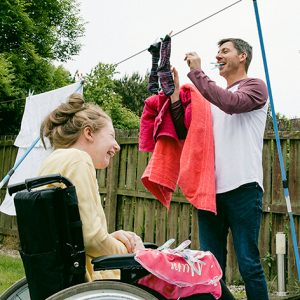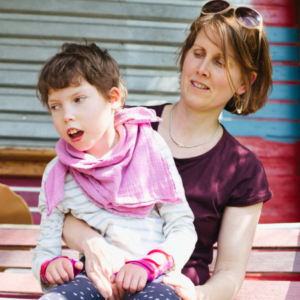To get the right NDIS support for your child, you and the professionals who are involved in your child’s life need to provide evidence of your child’s needs and the care you provide.
What is good evidence?
Good evidence is information from professionals about your child’s needs. It can include:
A summary letter from your GP or paediatrician
This is a short letter stating your child’s diagnosis and the date they were diagnosed, the impact it has on your child’s life, and what support they need. It should also state that the disability is lifelong. It can include information on what will happen if support is not continued or provided. The doctor needs to have known your child for more than six months to write a summary letter.
Reports from therapists
These reports focus on how your child’s disability impacts their capacity to do everyday things. They should explain how your child’s disability impacts their daily life in different ways, and they should include recommendations for support that will help your child meet their goals.
The length of your relationship with a therapist matters to the NDIS. It’s important that the healthcare professional writing the report is someone you’ve been seeing for over six months.
Assessments from therapists
These assessments are done by people such as occupational therapists, speech therapists and psychologists. They assess how your child is doing compared with children of the same age without disability.
This can include checking your child’s motor skills, communication skills, hearing, or vision, and how they understand information. Some assessment appointments are covered by Medicare but there may be an out-of-pocket cost.
Having a recent Functional Assessment done by an occupational therapist is helpful. If your child already has an NDIS plan, make sure you leave enough in your child’s budget to fund a Functional Assessment and request it before your plan ends. These assessments can take a few weeks to finish, so it’s good to start early.
All the information you provide as evidence should be current and not more than two years old.
It’s ok to ask for your plan meeting to be postponed if assessments and reports take longer than expected. It’s important the NDIS has all the information to get a clear picture of your child’s needs.
Current reports
It is good to keep your NDIS evidence up to date. Make sure your assessments and reports reflect your current needs. It should give the NDIS a clear snapshot of your present situation and details of the challenges and support you need.
Remember to keep your evidence fresh, as it may strengthen your case to access the support you need.
All the information you provide as evidence should be current and not more than two years old. It’s ok to ask for your plan meeting to be postponed if assessments and reports take longer than expected. It’s important the NDIS has all the information to get a clear picture of your child’s needs.
The NDIS has a guide to the best evidence for different disabilities.
How can I make sure the reports are useful?
GPs, paediatricians, and allied health therapists should write reports in a way that supports NDIS planning.
Report recommendations need to include:
- How it is reasonable and necessary
- How they relate to the child’s disability
- How they will help achieve your child’s goals
- How they will increase or maintain functional capacity and social and economic participation
- How they are evidence-based and value for money
- How the support is something the NDIS funds
The reports should cover the six main areas that the NDIS suggests. It’s important to focus your NDIS evidence on these areas to show that your child has a “substantially reduced functional capacity”:
- Communication: expressing needs and understanding others through speech, writing, or sign language
- Social interaction: making friends, participating in activities, managing emotions, and following social norms
- Learning: acquiring, remembering, and applying knowledge and skills
- Mobility: moving around and performing manual tasks
- Self-care: personal hygiene, grooming, feeding, bathing, dressing, and health management
- Self-management: organising tasks, making decisions, and problem-solving
Make sure reports are accurate
Read all reports to check they are accurate and easy to understand. If you have multiple therapists they should be working together. Make sure their reports don’t contradict each other.
Ask for any corrections to be made before you give your documents to the NDIS. You can also ask for a summary paragraph at the start of the document. Use headings, bullet points, and short summaries to make the report easier to read and find what’s important.
Keep a copy of all information you give to the NDIS, early childhood partner or Local Area Coordinator (LAC). If you email information, ask for confirmation it has been received.
Evidence that what you do is above and beyond parental responsibility
Often parents of children with disability provide a much higher level of care to their child when compared to a similar-aged child without disability.
The NDIS will look at whether your child’s needs are greater than those of a similar-aged child because of their disability. They will consider what the NDIS can provide and what support is normally provided by parents.
Information from families is one of the most important sources of evidence that the care you provide is greater than what is normally considered parental responsibility. Choose a way to record this information that works best for you.
This can include:
- A spreadsheet to record how much time you spend caring for your child. Make sure you include all the administrative tasks involved with your child’s care
- A detailed diary to describe the care you provide over 24 hours or over one week
- A video of how caring for your child is different from caring for a child without disability
- A timetable of what a week looks like, including appointments
You can also ask your child’s therapists to include information in their reports about the additional care your child needs compared to a child without disability of a similar age.
Evidence for respite and support for your family
A Carer Statement is good evidence of the impact of caring on your whole family. It’s a good way to highlight your family situation, such as being a single parent, having other children with disability, or caring for elderly parents.
Useful links
Providing evidence of your disability
Types of disability evidence
Information for GPs and health professionals
Information for health professionals, service providers and supporters
Practical resources for GPs and other health professionals
Supports funded by the NDIS
Does the support meet the reasonable and necessary criteria?






